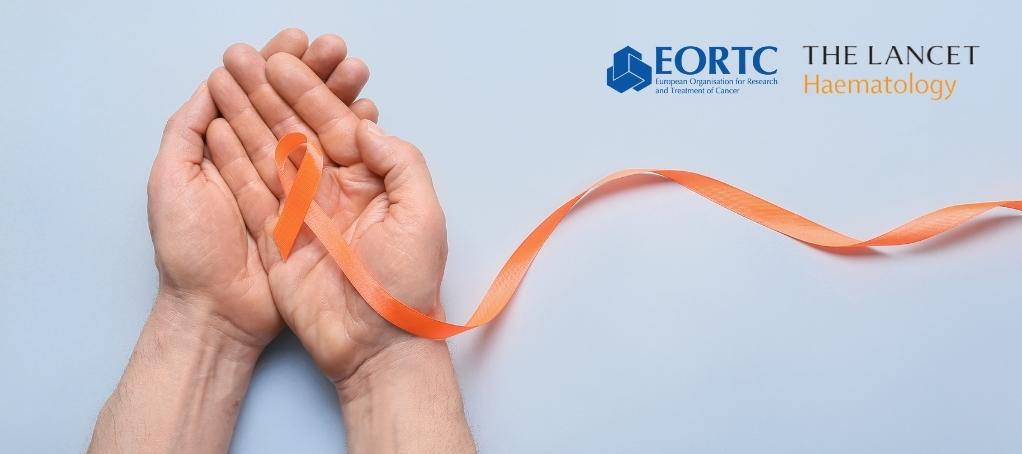Treatment with decitabine resulted in a similar survival and fewer adverse events compared with conventional chemotherapy in older fit patients with acute myeloid leukaemia
31 Oct 2023
Brussels, 31 October 2023 – Acute myeloid leukaemia (AML) is a blood cancer that predominantly occurs in older patients. Intensive chemotherapy regimens have been used for decades to treat patients regarded as sufficiently fit to tolerate this treatment. Allogeneic haematopoietic cell transplantation following treatment with chemotherapy drugs can reduce the risk of a relapse, thus offering the primary curative approach. However, many older patients with AML treated with intensive chemotherapy die or cannot undergo allogeneic haematopoietic cell transplantation due to toxicity caused by intensive chemotherapy.
Hypomethylating agents are drugs that have significantly improved the prognosis of elderly patients regarded as unfit to receive intensive treatment. We hypothesised that replacing this intensive chemotherapy with a hypomethylating agent (decitabine) could improve outcomes of patients 60 years of age or older and fit to receive intensive chemotherapy. To investigate this hypothesis, the collaborative groups EORTC Leukaemia Group, GIMEMA and GMDS-SG joined forces to conduct the EORTC-1301-LG-AML21 phase III clinical trial (NCT02172872) in which we compared a 10-day decitabine monotherapy schedule with intensive chemotherapy in this patient population. The study was led by the EORTC Leukaemia Group and coordinated by Professor Gerwin Huls from University Medical Centre Groningen, Professor Michael Lübbert from the University Medical Centre Freiburg, and Professor Pierre Wijermans from the Haga Teaching Hospital (names of study coordinators provided in alphabetical order). Professor Adriano Venditti from the University of Rome Tor Vergata coordinated the GIMEMA activities.
The results, with 606 patients accrued at 54 centres in 9 European countries, were just published1 in one of the leading medical journals (The Lancet Haematology). They showed a comparable overall survival between the two treatment arms (HR 1.04, 95% CI 0.86-1.26; p-value 0.68). At 4 years, 26% of patients from the decitabine arm and 30% from the intensive chemotherapy arm were estimated to be alive. The proportion of patients who underwent allogeneic haematopoietic cell transplantation as a part of the study protocol was comparable as well (40% for decitabine, 39% for ”3+7” at 4 years) and more than half of patients in both treatment arms underwent allogeneic haematopoietic cell transplantation at some timepoint. A notable difference between the treatment arms was observed regarding the incidence of severe adverse events during the treatment with decitabine as compared with intensive chemotherapy. Decitabine treatment showed lower incidences of severe infections (41% vs 53%), oral mucositis (2% vs 10%) and diarrhoea (1% vs 8%).
The results of our trial support the use of hypomethylating agents as the backbone of AML treatment, and further research in which new treatments are added to this backbone.
Comments by the Study Coordinators:
“This de-escalation study was conceived with the goal of improving the bridging of older AML patients safely to the curative approach of allografting, by administering a better-tolerated, age-appropriate drug treatment, without sacrificing antileukemic activity. Therefore we are really delighted that by this strategy, more than 50 % of all patients could actually receive the curative treatment. Hypomethylation-based combination treatment of AML followed by allografting is the logical consequence, and has recently been introduced at specialized centres across Europe, North America and Asia.”
About EORTC
The European Organisation for Research and Treatment of Cancer (EORTC) is a non-governmental, non-profit organisation, which unites clinical cancer research experts throughout Europe, to define better treatments for cancer patients to prolong survival and improve quality of life. Spanning from translational to large, prospective, multi-centre, phase III clinical trials that evaluate new therapies and treatment strategies, as well as patient quality of life, its activities are coordinated from EORTC Headquarters, a unique international clinical research infrastructure, based in Brussels, Belgium.
1Lübbert et al. (2023). 10-day decitabine versus 3 + 7 chemotherapy followed by allografting in older patients with acute myeloid leukaemia: an open-label, randomised, controlled, phase 3 trial
Related News
Meet the new EORTC Board
9 Jul 2024
We are pleased to announce the release of the EORTC 2023 Annual Report
17 Jun 2024
Dr Denis Lacombe, EORTC CEO, appointed stakeholder co-chair of ACT EU advisory group
24 May 2024
Clinical Trials Day 2024: a Q&A on pragmatic clinical trials
20 May 2024
EORTC/EMA workshop suggests an international way forward for treatment optimisation studies
8 May 2024
EORTC’s Participation at the ESTRO Congress 2024
29 Apr 2024
EORTC: Advancing research and treatment for rare cancers
29 Feb 2024
EORTC Fellowship Programme: celebrating more than 20 years of impactful collaboration
22 Feb 2024
Appointment of Malte Peters as EORTC Strategic Alliance Officer
9 Feb 2024
Unique series of workshops in partnership with the European Medicines Agency (EMA)
7 Feb 2024


